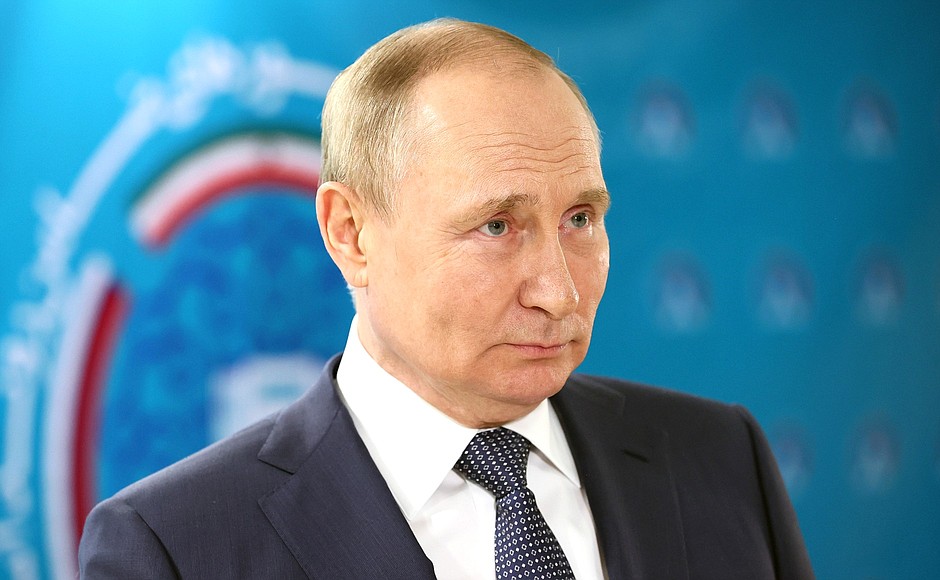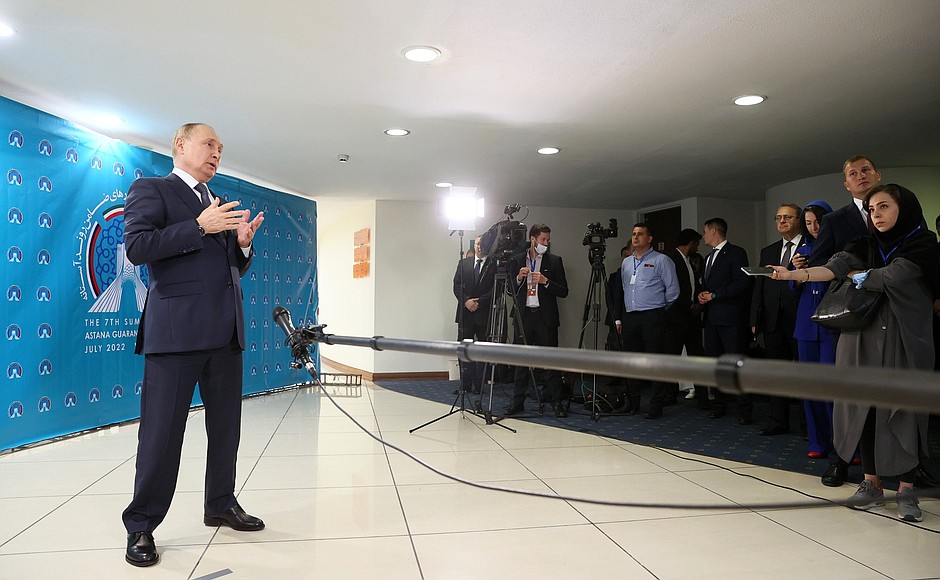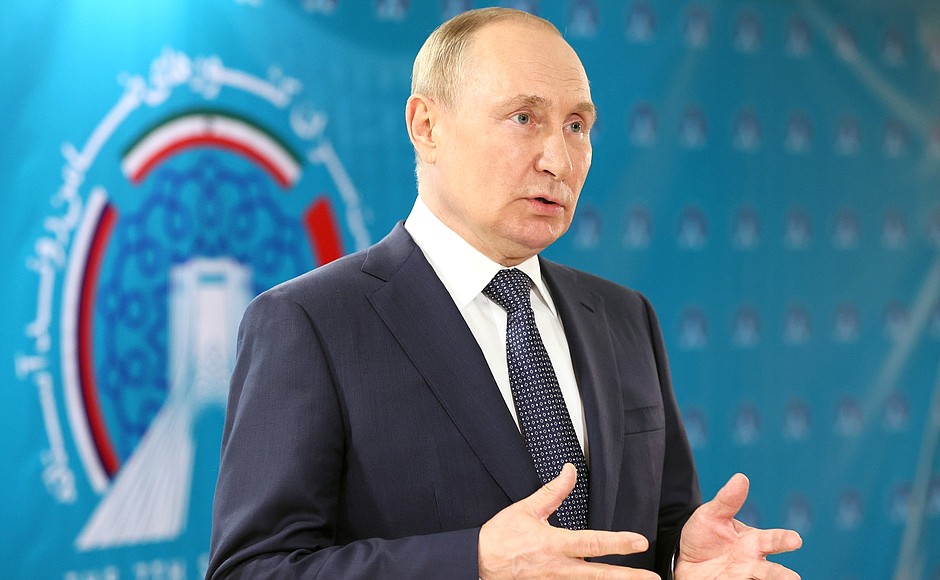Question: Mr President, some would think the world has forgotten about Syria amid the numerous issues on the international agenda. But we have seen today that this is not so.
We would like to hear your views on the situation on the ground in Syria. A great deal has been said today about points of contact, but there are many differences as well. Have you discussed or coordinated any fundamentally new solutions today? I am referring primarily to these differences.
President of Russia Vladimir Putin: What I would like to begin with is not the differences but the fundamental issues that allow us to work and continue our efforts in the trilateral format. All of us believe that it I necessary to guarantee the territorial integrity of the Syrian Arab Republic and to eliminate all sorts of terrorists, which I will not enumerate here. This is the fundamental and the most important thing, as we have pointed out again in our joint statement. I believe that this is very important.
Additional
Yes, there are certain differences, which is obvious, but all of us support the constitutional process. Thanks to our efforts, we have brought together various conflicting parties at one negotiating platform, including the opposition and the official authorities of the Syrian Arab Republic, experts and representatives of public organisations, as well as the UN. I believe this is extremely important. This is the first point.
The second. Humanitarian aid is being provided to Syria, for which there is particularly great demand today, because the sanctions imposed on Syria and the Syrian people have produced a deplorable result: nearly 90 percent of people in Syria are living below the poverty line. The situation in Syria is extremely serious.
Of course, it would be unfair to give priority attention to certain groups, to politicise humanitarian aid.
Third. There are different approaches to organising humanitarian aid. We have always believed that it should be organised in full compliance with international humanitarian law. This means that all humanitarian aid must be provided through the official Syrian authorities, through Damascus. However, we have agreed to extend the existing procedure for six months, including for deliveries to the Idlib zone, so as to have more time for coordinating our positions.
There is some disagreement about what is happening in Northern Syria. Incidentally, we also have some common ground here: all of us believe that US troops should leave this area. This is the first point. And they should stop looting the Syrian state, the Syrian people, taking their oil illegally. But there is disagreement about how to organise and stabilise the situation in that region. As you know, Russian-Turkish observation convoys are working there together.
However, in our view, in order to ensure a long-term, stable situation there it is necessary to transfer the entire territory under the control of the official authorities in Damascus, under the control of the Armed Forces of the Syrian Arab Republic, and then it will be possible to hold a dialogue with those who are responsible – in this case the official Syrian authorities. I believe it would greatly stabilise the situation there.
But in general, it is work in progress. As I have said many times and would like to stress once again, the work of this tripartite group – Russia, Turkiye and Iran – this joint effort to search for compromises and find these compromises has led to the fact that over 90% of Syria is now under official government control and, as we say in such cases, we have broken the back of international terrorism there. This is a great result of this joint work.
Question: Mr President, you had three one-on-one meetings today, first with Mr Raisi, then with Mr Khamenei, and then with Mr Erdogan, and there were no news conferences after these meetings. All we know is the topic you were discussing, the official part.
In particular, you said that you discussed the grain issue with your Turkish counterpart, the issue of supplying Russian and Ukrainian grain to international markets. Could you tell us some more about that, please?
Vladimir Putin: There are no secrets here; in fact, almost everything is known. There are some subtleties; maybe I do not always have time to follow what is happening in the information field. I will tell you how I see it.
First, what was the highlight of the three meetings? At each meeting, there were issues that could be considered central to a particular bilateral meeting.
For example, as I said at the news conference, in my press statement, the main theme at the meeting with the Spiritual Leader of Iran was strategic issues, including developments in the region. This is natural, as it is the sphere of his activity. It was very important for me to hear his opinion, his assessment. I have to say that we have very similar views with Iran on many aspects. So, it was very important and very useful.
As for my meeting with President Raisi, we discussed primarily economic matters. I would like to note that Russian-Iranian trade has grown by 40 percent over the past six months. This is a very good indicator.
There are promising spheres for our cooperation, and there is a great variety of them, like infrastructure development. You may know that a deputy prime minister of the Russian Government chairs a group that is responsible for developing relations in the South Caucasus, including infrastructure projects in the South Caucasus, that is, in Azerbaijan, Armenia and Russia. A great deal can be achieved in this sphere in cooperation with Iran.
As you know, the first pilot train is travelling along the North-South Railway line. It is a short route to ports in the south of Iran, which further leads to the Persian Gulf and India.
There is a practical project: the Rasht-Astara railway is a short 146-kilometre line across Iran. Azerbaijan is interested in its construction. I recently met with President Aliyev during the Caspian Summit, and we discussed this matter. Iran is interested in this as well, as our Iranian partners have told us just now. Russia is interested in this, because it will connect Russia’s northern region, St Petersburg, directly to the Persian Gulf. It is a very interesting and promising project. The task now is to build this line, which is only 146 kilometres. Russia is ready to do this.
We need to coordinate the conditions of this construction project. We have discussed its general outlines with our Iranian partners and friends, and we have coordinated it with Azerbaijan. I hope we will get down to business now. And then, it will be an interesting job for us. It actually amounts to exporting the services of Russian Railways (RZD). This is one of the relevant examples.
There are other spheres. There are security issues relevant to Iran’s nuclear programme. It was very important for us to understand the sentiments of the Iranian party regarding this work. It also involves Russia, which is contributing to the joint efforts aimed at relaunching interaction between Iran and the IAEA. I will not speak about this now, but Russia is playing a considerable role in this.
The grain issue. It is what we discussed with the President of Turkiye. I have already said that the Republic of Turkiye and personally President Erdogan have done a great deal to facilitate the agreement on Ukrainian grain exports. But initially we suggested that it should be adopted as a package, that is, we would facilitate the Ukrainian grain exports provided all the restrictions on the potential exports of Russian grain are lifted. This is what we initially agreed upon with international organisations. They pledged to formulate this as a package solution. Nobody has so far raised any objections, including our American partners. We will see what comes of it in the near future.
As you know, the Americans have actually lifted restrictions, for example, on the delivery of Russian fertilisers to the global market. I hope this will also happen with regard to the export of Russian grain if they really want to improve the situation on the global food markets. As I have said, we are ready to do this right now. We can export 30 million tonnes of grain, and our export potential based on this year’s harvest will be 50 million tonnes.
Question: Mr President, a serious energy crisis is developing in Europe, which is discussing the possibility of Gazprom cutting off gas deliveries. The company has allegedly issued an official notification to one of its German clients, citing force majeure circumstances.
Are there grounds for accusing Russia of causing this energy crisis? Will Gazprom continue to honour its obligations
Vladimir Putin: First of all, Gazprom has always honoured, and will continue to honour its commitments.
There are no grounds at all for the attempts by our partners to shift or try to shift the blame for their own mistakes on Russia and Gazprom.
What is the situation with energy deliveries? In 2020, in the first half of 2020, gas cost 100 euros per 1,000 cubic metres in Europe. The price rose to 250 euros in the first half of 2021. Today it is 1,700 euros per 1,000 cubic metres of gas.
What is happening? I have spoken about this on numerous occasions, and I do not know if we should go into detail regarding the energy policies of European countries, which underrate the importance of traditional sources of energy and have put money on non-traditional energy sources. They are big experts on non-traditional relations, and they have also decided to make a bid for non-traditional energy sources like the sun and wind.
Last winter was long, there wasno wind, and that did it. Investment in the fixed assets of traditional energy producers has decreased because of previous political decisions: banks do not finance them, insurance companies do not insure them, local governments do not allocate land plots for new projects, and pipeline and other forms of transportation are not developing. This is a result of many years, probably a decade of this policy. This is the root cause of price hikes rather than any actions by Russia or Gazprom.
What is going on today? Until recently, we supplied gas to Europe without Turkiye: we supplied around 30 billion cubic metres a year to Turkiye, and 170 billion to Europe, 55 billion via Nord Stream 1, and, if memory serves me, 33 billion were supplied via Yamal-Europe, via the two strings that run through Ukraine. About 12 billion were delivered to Europe through Turkiye via TurkStream.
Ukraine suddenly announced that it was going to close one of the two routes on its territory. Allegedly because the gas pumping station is not under its control but on the territory of the Lugansk People's Republic. But it found itself under the control of the Lugansk People's Republic several months before, and they closed it just recently without any grounds. Everything was functioning normally there, no one interfered. In my opinion, they closed it simply for political reasons.
What happened next? Poland imposed sanctions on Yamal-Europe, which supplied 33 billion cubic metres of gas. They used to take 34, I think, 33–34 million cubic metres a day from us. They shut it down completely. But then we saw that they turned on the Yamal-Europe pipeline in reverse mode, and they started taking about 32 million a day from Germany. Where is the gas from Germany coming from? It is our Russian gas. Why from Germany? Because it turned out to be cheaper for the Poles. They used to get it from us at a very high price, closer to the market price, whereas Germany gets it from us 3–4 times cheaper than the market price under long-term contracts.
It is profitable for German companies to sell it to the Poles at a small premium. It is profitable for the Poles to buy it because it is cheaper than to buy it directly from us. But the volume of gas in the European market has decreased, and the total market price has gone up. Who has won? All Europeans only lost. This is the second point: Yamal-Europe.
So, first one of the routes in Ukraine was shut down, then Yamal-Europe was shut down, now Nord Stream 1, which is one of the main routes – we pump 55 billion cubic metres a year through it. There are five Siemens gas compressor stations working there, and one is on standby. One compressor had to be sent out for repairs. A repaired compressor was supposed to come from Canada, from the Siemens plant in Canada, to replace it. But it ended up under sanctions in Canada. So, one pumping station, just one piece of equipment was out of order because of scheduled maintenance work and it has not been returned from Canada.
Now we are being told that the unit will be delivered from Canada soon, but Gazprom does not have any official documents yet. We must certainly obtain them, because this is our property, it is the property of Gazprom. Gazprom should receive not only the hardware, not only the gas pumping unit, but also the accompanying documents, both legal and technical documentation. We must be able to see what Gazprom is taking – the turbine’s current condition as well as its legal status, whether it is under sanctions or not, what we can do with it, or maybe they are taking it back tomorrow. But that is not all.
The problem is that at the end of July, on July 26, I think – we can ask Gazprom – another turbine should be sent for routine maintenance, for repairs. And where will we get a replacement from? We do not know.
One more turbine is actually out of order because of some crumbling of its internal liner. Siemens has confirmed this. That leaves two operational units, which are pumping 60 million per day. So, if one more is delivered, fine, we will have two in operation. But if it is not, only one will be left, and it will pump only 30 million cubic meters per day. You can count how much time it will take to pump the rest. How is this Gazprom’s responsibility? What does Gazprom even have to do with this? They have cut off one route, then another, and sanctioned this gas pumping equipment. Gazprom is ready to pump as much gas as necessary. But they have shut everything down.
And they have fallen into the same trap with the import of oil and petroleum products. We hear all sorts of crazy ideas about capping the volume of Russian oil imports or the price of Russian oil. This is going to lead to the same situation as with gas. The result (I am surprised to hear people with university degrees saying this) will be the same – rising prices. Oil prices will spiral.
As for gas, there is another route we are ready to open, which is Nord Stream 2. It is ready to be launched, but they are not launching it. There are problems here as well, I discussed them with the Chancellor about six or maybe eight weeks ago. I raised this issue; I said that Gazprom had reserved the capacity, and that this capacity needed to be used, and it cannot be suspended in mid-air indefinitely.
The answer was that there were other issues on the agenda, more important things, so it is difficult for them to deal with this right now. But I had to warn them that then we would have to redirect half of the volume intended for Nord Stream for domestic consumption and processing. I raised this issue at the request of Gazprom, and Gazprom has actually already done it. Therefore, even if we launch Nord Stream 2 tomorrow, it will not pump 55 billion cubic meters, but exactly half that amount. And given that we are already halfway through this year, it would be just a quarter. Such is the supply situation.
But – I said this at the beginning of my answer to your question and I want to end with this – Gazprom has always fulfilled and will always fulfil all of its obligations, as long as, of course, anyone needs it. First, they themselves close everything, and then they look for someone to blame – it would be comical if it were not so sad.
Question: You spoke with Mr Erdogan today. He has repeatedly stated his readiness to arrange talks between you and Vladimir Zelensky. Has this issue surfaced today? Are you ready to meet with the President of Ukraine?
Vladimir Putin: President Erdogan is making a lot of efforts to create the necessary conditions for normalising the situation. It was during our talks in Istanbul that we actually reached an agreement, and it only remained to initial it. But, as you know, after that, when our troops, in order to create the right conditions, withdrew from central Ukraine, from Kiev, the Kiev authorities backed off on those agreements. These were agreements that had actually been achieved. So, you see that the final result depends, of course, not on intermediaries, but on the parties’ commitment to fulfil the agreements reached. And we can see today that the Kiev authorities have no interest in that.
As for Turkiye's efforts, as well as other countries’ proposals – Saudi Arabia has offered its mediation services, and the United Arab Emirates, and they do have such capabilities – we are grateful to all our friends who are interested in resolving this crisis for providing their opportunities. Even their willingness to make some contribution to this noble cause is worth a lot. We are deeply grateful for that.


